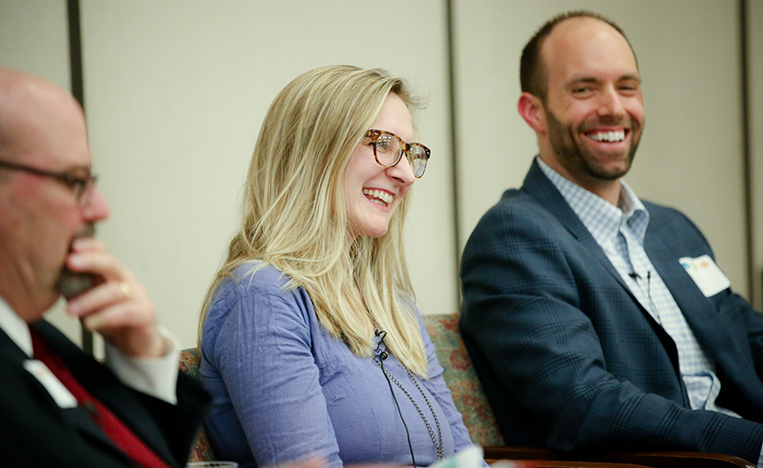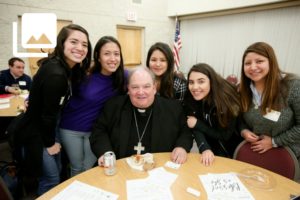By: Matthew Davis
Passing on the faith to the next generation doesn’t happen automatically.
Father Spencer Howe, the pastor of Holy Cross in Minneapolis, articulated that fact in leading a panel discussion on millennials for a crowd of more than 50 people Jan. 25 at St. Therese in Deephaven. He referred to Pope St. John Paul II’s words of each new generation being a “whole new continent that has never experienced Christ.”
The five panelists included leaders in youth and young adult ministry, and they explained how their resources have made difference in the lives of millennials in addition to assessing the current challenges. Millennials, identified as those born in 1981 and later, and post-millennials, those born in 1998 or later, have disappeared from the Church by droves.
Panelist Mark Berchem, president of NET Ministries Inc. in West St. Paul, noted that millennials and post-millennials, born in 1998 or later, disappear from the Church at the age of 13 on the average. He referred to the stat from the University of Georgetown’s Center for Applied Research in the Apostolate.
“I think the Church is at stake, and even broader than that, I think our society’s at stake,” Berchem said. “As Catholics, we’re known for educating people, our medical care [and] our outreach to the poor. Without the Catholic Church alive and vibrant, our society begins to fall apart.”
Father Howe outlined that the Church offers three things that can draw millennials back — authenticity, community and purpose.
Panelist Nell O’Leary Alt, managing editor women’s online ministry Blessed Is She, touched on millennials’ challenge to find purpose in suffering. She said millennials tend to avoid suffering, but the Church offers an answer to the ageless question of suffering’s purpose.
“The Church offers us a way to enter into that ‘kerygma,’ that cross, death and resurrection of Christ,” Alt said. “That’s one of the most authentic things about our faith.”
Jimmy Dunn, the director of youth ministry for Annunciation in Minneapolis, said too much of a gap develops between a high school senior’s graduation and becoming a new parent and bringing a baby for baptism. Dunn said he often sees youths become disengaged after youth ministry involvement, get married outside the Church in destination weddings and do not show up again until they want their children baptized.
“There’s not enough programs for young adults,” Dunn said. “They want to continue with that community [and] they want to continue with authenticity [from youth ministry], but that’s where we’re lacking.”
Many of the panelists described community as a game changer in their faith lives and in the lives of people they serve.
Panelist Dave Rahe, a parishioner of Holy Name of Jesus in Medina, explained what a different community has made in his parish’s life. His wife and fellow younger mothers in the parish formed a Mothers of Preschoolers group, which also inspired the husbands to form a men’s group.
“People want it,” Rahe said of community. “[We] need to take action and make it happen.”
Fellow panelist Vincenzo Randazzo spoke of Vespers at Lourdes, a program at Our Lady of Lourdes in Minneapolis where young adults pack the church to pray evening prayer, hear and inspiring talk and have fellowship. The director of advancement for St. Stephen in Minneapolis, Randazzo noted the simplicity of the event has really been a matter of “opening the doors” for the church. He added that’s a place where a significant number of people have met their spouses.
“I call it ‘Catholic singles 3D’ where you can leave your computer and actually meet with people. The Church has always done things like this—people have met their spouse at a church social, a church meeting,” said Randazzo, who also serves as the men’s evangelization manager for the Office of Evangelization and Catechesis for the Archdiocese of St. Paul and Minneapolis.
Alt said that even the online communities of Blessed Is She has a focus of making in-person connections. The regional groups strive to host brunches for women.
Dunn credited Annunciation’s current pastor, Father Brian Park, for adapting the Mass schedule in order to unite youth in the parish with a Sunday night Mass. Dunn also noted that building community must go beyond a person receiving Communion and being greeted at the doors for Mass. It takes an invitation, he said.
Steven Zettel, 23, who attended the forum had that experience in college with St. Paul’s Newman Center at North Dakota State University. Zettel said a Fellowship of Catholic University Students student missionary invited him to a Bible study, and he got involved in FOCUS throughout college.
“That’s the main area we need to focus on,” said Zettel, now a parishioner of St. Gabriel in Hopkins, speaking of invitation.
Dunn said taking students on mission also leads them to recognize purpose in their lives. He has them unplug from their phones for a week as they serve somewhere outside of Minnesota. He said they find it powerful and significant numbers of youth ministry alumni join the parish’s Haiti mission trip annually.
Berchem also said that going on mission inspires young people. He said the missionaries with NET, who got out for nine months to spread the Gospel, “create environments of meaningful service” in their work.
“Mission motivates,” Berchem said.
The Catholic Community Foundation, a St. Paul-based non-profit, hosted the event as part its Giving Insights forum series exploring contemporary issues facing the Church. CCF stewards the philanthropic, financial resources of Catholic individuals, families and organizations to support the missions and ministries that strengthen the Catholic community in Minnesota.
“We have learned and work really hard to learn more about what the needs are in this community and where are the resources to meet those needs,” CCF president Anne Cullen Miller said.
Go to the Catholic Spirit website.


